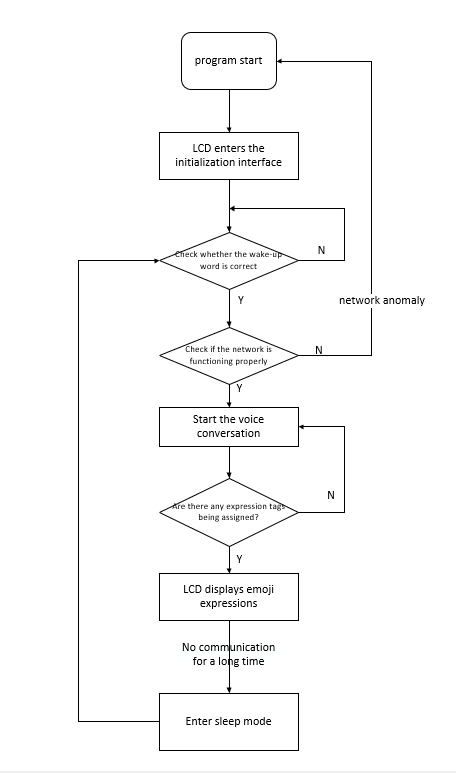Software design
2025-10-29
Software framework
Framework design diagram

Business system startup process

Code explanation
AI wake-up & Human voice detection
class Application(object):
def on_keyword_spotting(self, state):
logger.info("on_keyword_spotting: {}".format(state))
if state == 0:
# Trigger the wake-up word
if self.__working_thread is not None and self.__working_thread.is_running():
return
self.__working_thread = Thread(target=self.__working_thread_handler)
self.__working_thread.start()
self.__keyword_spotting_event.clear()
else:
self.__keyword_spotting_event.set()
def on_voice_activity_detection(self, state):
gc.collect()
logger.info("on_voice_activity_detection: {}".format(state))
if state == 1:
self.__voice_activity_event.set() # It is claimed that
else:
self.__voice_activity_event.clear() # No One Can Hear You
AI initialization
Initialize AI objects and other hardware drivers.
class Application(object):
def __init__(self):
Pin(Pin.GPIO33, Pin.OUT, Pin.PULL_PD, 1)
# Initialize the screen
self.lvgl=lvglManager()
# 初始化充电管理
self.charge_manager = ChargeManager()
# Initialize audio management
self.audio_manager = AudioManager()
self.audio_manager.set_kws_cb(self.on_keyword_spotting)
self.audio_manager.set_vad_cb(self.on_voice_activity_detection)
# Initialize network management
self.net_manager = NetManager()
# Initialize the task scheduler
self.task_manager = TaskManager()
# Initialize Protocol
self.__protocol = WebSocketClient()
self.__protocol.set_callback(
audio_message_handler=self.on_audio_message,
json_message_handler=self.on_json_message
)
self.__working_thread = None
self.__record_thread = None
self.__record_thread_stop_event = Event()
self.__voice_activity_event = Event()
self.__keyword_spotting_event = Event()
AI dialogue interruption logic
class Application(object):
def __chat_process(self):
self.start_vad()
try:
with self.__protocol:
self.__protocol.hello()
self.__protocol.wakeword_detected("小智")
is_listen_flag = False
while True:
data = self.audio_manager.opus_read()
if self.__voice_activity_event.is_set():
# It is claimed that
if not is_listen_flag:
self.__protocol.listen("start")
is_listen_flag = True
self.__protocol.send(data)
# logger.debug("send opus data to server")
else:
if is_listen_flag:
self.__protocol.listen("stop")
is_listen_flag = False
if not self.__protocol.is_state_ok():
break
# logger.debug("read opus data length: {}".format(len(data)))
except Exception as e:
logger.debug("working thread handler got Exception: {}".format(repr(e)))
finally:
self.stop_vad()
music organizer
Uniformly manage the audio input and output, encoding and decoding, and voice recognition related functions of the equipment (keyword recognition KWS and voice activity detection VAD), and provide callback interfaces for upper-layer applications to use.
class AudioManager(object):
def __init__(self, channel=0, volume=11, pa_number=29):
self.aud = audio.Audio(channel) # 初始化音频播放通道
self.aud.set_pa(pa_number)
self.aud.setVolume(volume) # 设置音量
self.aud.setCallback(self.audio_cb)
self.rec = audio.Record(channel)
self.__skip = 0
# ========== 音频文件 ====================
def audio_cb(self, event):
if event == 0:
# logger.info('audio play start.')
pass
elif event == 7:
# logger.info('audio play finish.')
pass
else:
pass
def play(self, file):
self.aud.play(0, 1, file)
# ========= opus ====================
def open_opus(self):
self.pcm = audio.Audio.PCM(0, 1, 16000, 2, 1, 15) # 5 -> 25
self.opus = Opus(self.pcm, 0, 6000) # 6000 ~ 128000
def close_opus(self):
self.opus.close()
self.pcm.close()
del self.opus
del self.pcm
def opus_read(self):
return self.opus.read(60)
def opus_write(self, data):
return self.opus.write(data)
# ========= vad & kws ====================
def set_kws_cb(self, cb):
self.rec.ovkws_set_callback(cb)
def set_vad_cb(self, cb):
def wrapper(state):
if self.__skip != 2:
self.__skip += 1
return
return cb(state)
self.rec.vad_set_callback(wrapper)
def end_cb(self, para):
if(para[0] == "stream"):
if(para[2] == 1):
pass
elif (para[2] == 3):
pass
else:
pass
else:
pass
def start_kws(self):
self.rec.ovkws_start("_xiao_zhi_xiao_zhi", 0.7)
def stop_kws(self):
self.rec.ovkws_stop()
def start_vad(self):
self.__skip = 0
self.rec.vad_start()
def stop_vad(self):
self.rec.vad_stop()
LCD屏显
The display of the LCD's expressions is controlled through the session bus sys_bus.
def update_emoji(topic,msg):
screen_gif.set_style_opa(lv.OPA.TRANSP, 0)
if msg == "happy":
screen_gif.set_src("U:/media/happy_min.gif")
#print("update_emoji: happy screen")
elif msg == "cool":
screen_gif.set_src("U:/media/cool_min.gif")
#print("update_emoji: cool screen")
elif msg == "thinking":
screen_gif.set_src("U:/media/think_min.gif")
#print("update_emoji: think screen")
elif msg == "angry":
screen_gif.set_src("U:/media/angry_min.gif")
#print("update_emoji: angry screen")
elif msg == "sleep":
screen_gif.set_src("U:/media/sleep_min.gif")
#print("update_emoji: happy screen")
utime.sleep_ms(20)
screen_gif.set_style_opa(lv.OPA.COVER, 0)
def update_status(topic, msg):
screen_word.set_text(msg+"...")
def update_screen(topic, msg):
try:
lcd.lcd_clear(0x0000)
if msg == "init_screen":
lv.scr_load(init_screen)
logger.info("change init_screen")
elif msg == "main_screen":
lv.scr_load(screen)
logger.info("change main_screen")
except Exception as e:
logger.error("update_screen error: {}".format(e))
def update_time(arg):
year, month, day, hour, minute, second = utime.localtime()[0:6]
toptime.set_text("{}:{}".format(hour,minute))
#logger.info("time update")
# subscribe topic to update emoji and status
sys_bus.subscribe("update_emoji",update_emoji)
sys_bus.subscribe("update_status",update_status)
sys_bus.subscribe("update_screen",update_screen)
class lvglManager:
#@staticmethod
def __init__(self):
#lv.scr_load(init_screen)
update_time(None)
timer1 = Timer(Timer.Timer1)
timer1.start(period=10000, mode=timer1.PERIODIC, callback= update_time)
utime.sleep(3)
#lv.scr_load(screen)
